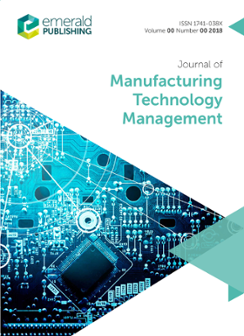Resilience, complexity and digital transformation: three case studies in the valves industry
IF 7.3
2区 工程技术
Q1 ENGINEERING, INDUSTRIAL
引用次数: 2
Abstract
PurposeThis paper shows how the interplay between organisational resilience and environmental complexity justifies the existence of differentiated yet successful approaches to digital transformation.Design/methodology/approachA multi-case method is applied to test our research hypotheses by contrasting the digital transformation of three Italian companies in the valves industry.FindingsDifferent combinations of technological and organisational tools, hence diversified digital transformations, can be successful, provided that they are supported by a coherent set of resilience factors and allow for the implementation of strategic approaches aligned with the resilience capacity of the firm.Practical implicationsAwareness that resilience capacity shapes digital transformation and the strategies available to engage with external complexity should focus managers to invest in the alignment and the reinforcement of the factors underlying organisational resilience.Originality/valueMost literature so far focused on the antecedents to digital transformation. In contrast, this paper focuses on the transformation process and highlights how the resilience capacity of the firm affects the unfolding of digital transformation and the emergence of diversified yet successful paths. In addition, in contrast with a dichotomous approach to external complexity this paper shows that digital transformation involves a mix of complexity reduction and complexity absorption strategies.弹性、复杂性和数字化转型:阀门行业的三个案例研究
目的本文展示了组织弹性和环境复杂性之间的相互作用如何证明存在差异化但成功的数字化转型方法。设计/方法论/方法运用多案例方法,通过对比三家意大利阀门行业公司的数字化转型,检验我们的研究假设。发现技术和组织工具的不同组合,从而实现多样化的数字化转型,只要它们得到一套连贯的恢复力因素的支持,并允许实施与公司恢复力能力相一致的战略方法,就可以取得成功。实际含义意识到应变能力塑造了数字化转型,以及应对外部复杂性的可用策略,管理者应集中精力投资于调整和加强组织应变能力背后的因素。原创性/价值迄今为止,大多数文献都关注数字化转型的前因。相比之下,本文关注的是转型过程,并强调了企业的应变能力如何影响数字化转型的展开和多样化但成功的路径的出现。此外,与二分法处理外部复杂性的方法相比,本文表明数字化转型涉及复杂性降低和复杂性吸收策略的混合。
本文章由计算机程序翻译,如有差异,请以英文原文为准。
求助全文
约1分钟内获得全文
求助全文
来源期刊

Journal of Manufacturing Technology Management
Engineering-Control and Systems Engineering
CiteScore
16.30
自引率
7.90%
发文量
45
期刊介绍:
The Journal of Manufacturing Technology Management (JMTM) aspires to be the premier destination for impactful manufacturing-related research. JMTM provides comprehensive international coverage of topics pertaining to the management of manufacturing technology, focusing on bridging theoretical advancements with practical applications to enhance manufacturing practices.
JMTM seeks articles grounded in empirical evidence, such as surveys, case studies, and action research, to ensure relevance and applicability. All submissions should include a thorough literature review to contextualize the study within the field and clearly demonstrate how the research contributes significantly and originally by comparing and contrasting its findings with existing knowledge. Articles should directly address management of manufacturing technology and offer insights with broad applicability.
 求助内容:
求助内容: 应助结果提醒方式:
应助结果提醒方式:


